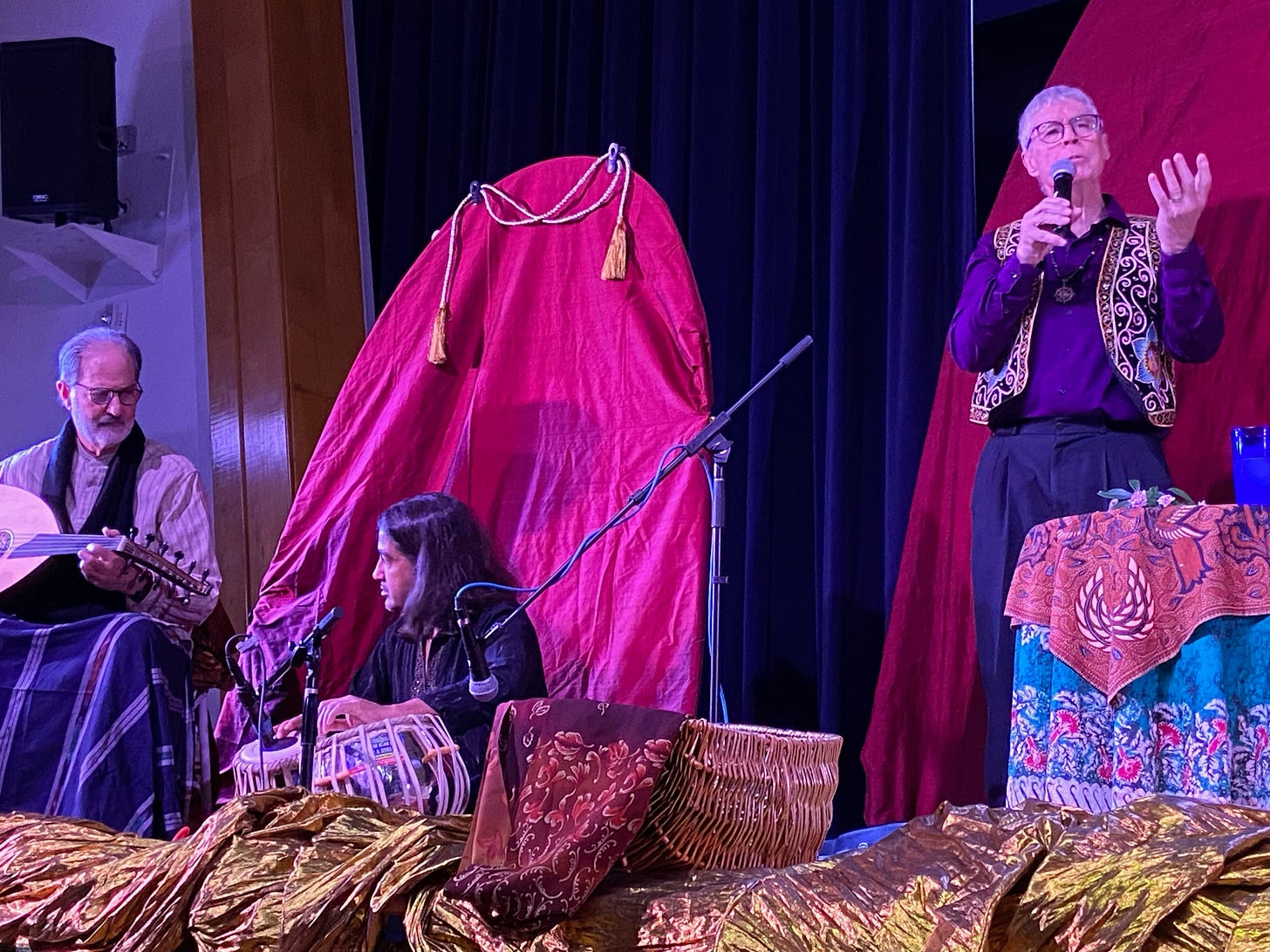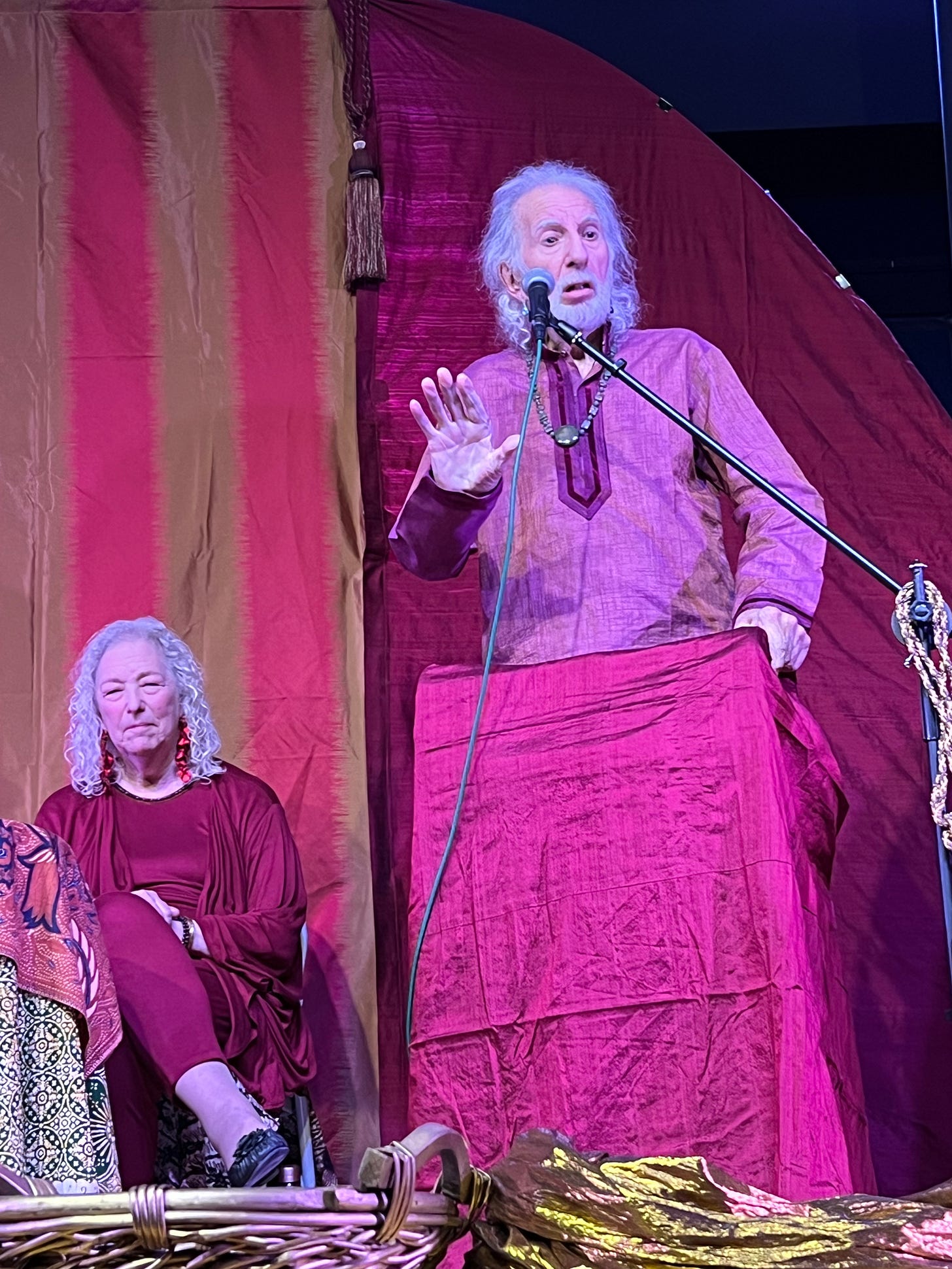Roundup: Everything's just Super
From Super Bowl Sunday to Rumi's Caravan to a new tiny home and a reminder of 1984
After a stormy Sunday and a week of power outages, it’s Super Sunday with the Super Bowl in Las Vegas, Super Bowl ads, Super Bowl odds, Super Bowl Halftime, and super-size snacks. There’s a football game somewhere in all that.
Last year’s Super Bowl was watched by 115.1 million people. (AP)
A record 67.8 million American adults are expected to bet US$23.1 billion on Super Bowl LVIII in Las Vegas. Up from $16 billion in 2023 (The Conversation). The numbers include legal and illegal gambling.
It’s illegal to bet on sports (except horse racing) in California and Missouri, the home states of the two Super Bowl teams. Two ballot measures to legalize gambling in California failed to win voter approval in 2022. (Cal Matters)
CBS is selling 30-second commercials for nearly $7 million each and they are expected to see $650 million in revenue for the event, both of which are up from previous years.
The Taylor Swift Super Bowl prop bets include how many times she is shown on the CBS broadcast, whether she will be shown during the National Anthem, and the color of her clothing and her lipstick. (CBS News).
Budweiser’s Clydesdales are considered “Hay-List Celebrities Every Director Wants to Work With,” according to the Wall Street Journal (paywall). “Industry veterans who shoot commercials consider working with the horses a career pinnacle, like a movie director who finally gets to direct Meryl Streep.”
Go Niners. They are playing the Kansas City Chiefs, the same team they lost to four years ago in the Super Bowl. If the 49ers win, it will be the team’s sixth Super Bowl, and its first since 1995, which was a win over the Chargers.
Of local interest:
The Rotary Club organized a Super Bowl pool that sold out almost immediately. They collected $2000 from members and will return half of that amount to winners. $1000 will go to the Sebastopol Rotary Education Foundation. Aleia Coate, who is cheering on the Niners, is the Super Bowl Board Chair. (Thanks, Richard Power.)
Hopmonk Sebastopol and School of Rock Santa Rosa are partnering up for a Fundraiser on Super Bowl Sunday. (From the press release:” “We are fundraising for the House Band tour this summer. We will be Raffling off a 65" TV and a Summer Camp at School of Rock ($549 Value). The tickets cost $5 or you can purchase 5 for $20. The Summer Camp will be drawn at the end of the First Quarter. The TV will be drawn at the end of the Third Quarter.”

If you’re not into Super Sunday, enjoy more sun. Super Bowl Sunday is a great time to do almost anything else but watch football. You won’t find many people out and about - a hike, a walk on the beach, playing tennis, pickleball or golf, shopping at the Farmer’s Market, visiting a museum … you’ll miss all the traffic that people like to complain about.
Things will stop being super as soon as tomorrow.
Sold-out Rumi’s Caravan
After all that Super Bowl talk, let’s turn to something that feels very Sebastopol - an evening of poetry and music in the ecstatic tradition called Rumi’s Caravan, which started in Sebastopol about twenty years ago. This year’s sold-out performance, which was organized by Larry Robinson and others, was a benefit for the Sebastopol Center for the Arts. It featured Doug von Koss, Kay Crista, Barry Spector, Maya Spector, Rebecca Evert and Larry Robinson with musical accompaniment by Jason Parmar and Don Fontowitz. Larry shared several photos, which look extravagant.
Second Tiny Home at Park Village
A new tiny home was installed at Park Village on Thursday, replacing an existing trailer. Tim Miller, Executive Director of West County Community Services, said that the tiny home “should last 20-30 years, with fewer annual maintenance costs than a trailer which usually lasts 4-5 years.” The first tiny home was installed in April, 2023, as reported in Sebastopol Times. “The tiny home should last 20-30 years, with fewer annual maintenance costs than a trailer which usually lasts 4-5 years,” said Miller.
A housing voucher will be used by the resident of the tiny house. “This will provide more stability for the residents and more finances for the project, which means less money from the City to support the project,” said Miller.
Surveillance State University
I asked a young woman who is a student at Sonoma State University if she planned to watch the Super Bowl. She answered that she’d like to watch the game but she has two exams to take online on Sunday. At first, I was surprised that she had to take tests on Sunday. Then she began explaining how the test is administered using automated proctoring, a practice that started during Covid but has continued even after students came back to campus. Colleges want to prevent students from cheating on tests taken remotely. One of the software providers is Proctorio, and one of its modules is called “Lockdown.”
To take the test, she sits at her computer and launches a recorded video session. At the start, she is prompted to show her ID, then to show her face straight on, then looking left and looking right.
The software locks down her web browser so that she can’t use it. Looking through her camera, the software continuously scans the environment around her looking for notes or open books. Once she begins taking the test, she is interrupted periodically and asked to hold up her laptop to show the entire room around her computer to make sure no one is in the room with her.
She can’t get up to use the bathroom and she’s warned at the beginning to make sure that won’t be necessary. If an unusual sound occurs like a dog barking or someone enters her room by accident, the video is flagged. Facial scans, room scans, constant monitoring — all this to take a 60-question multiple choice exam from home. The software sends the student’s test results to the professor along with a “Suspicion Score.”
The student I interviewed believes that professors use automated proctoring because it doesn’t require them or the students to be in class to take the test. Sonoma State is not the only one using automated proctoring; it’s mentioned on the SRJC website.
“The state’s two public university systems lack a uniform policy on e-proctoring” so that professors can make the choice to use it or not, wrote Itzel Luna in “California colleges still use remote proctoring despite court decision.” The article describes a Cleveland State student who sued the university, saying that online proctoring violated his privacy and was unconstitutional based on the “unreasonable search and seizure” clause of the Fourth Amendment. He won but the decision is under appeal.
The California State University Academic Senate passed two resolutions in 2021 that urged faculty and Cal State campuses to avoid using facial recognition software and e-proctoring in their classrooms. Academic Senate Vice Chairperson Thomas Norman, a professor at Cal State Dominguez Hills, said he grew concerned that e-proctoring software’s collection of student data was predatory. (CalMatters)
Later, in the same article, Norman said “professors can cut down on cheating by choosing creative assignments over typical exams, fostering a more personalized experience that makes students less likely to want to bend the rules.”
The Sonoma State faculty’s Senate Diversity Subcommittee published a Review of Inclusion and Justice (PDF) that asked professors to question whether they needed to use software such as Proctorio: “How am I considering who is harmed by the use of academic surveillance?”
This not only looks bad for Sonoma State and its students; it is really bad. It is normalizing the use of surveillance tools to create a culture of suspicion that accused everyone and undermines building trust, which is what an honor code is supposed to do.
Sonoma State administrators and professors might consider watching this brilliant dystopian Super Bowl commercial from Apple in and about 1984.
Sadly, 2024 is looking more like 1984.
The Week of February 3-10
Thank you to the fifteen new paid subscribers that pledged support this week. Jack said that he subscribes because he wants “to stay on top of issues specific to the city in which I reside” and that Sebastopol Times provides “stories that I could not read elsewhere.” Thanks, Jack. Laura and I especially enjoy reading the great comments we get from new subscribers.




